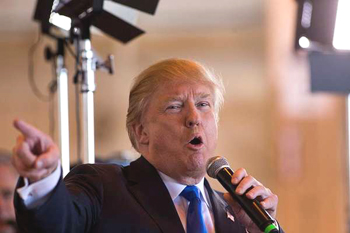Washington, Feb 6: President Donald Trump has drawn a parallel between the US and Russian President Vladimir Putins regime by saying many people have been killed around the world due to Americas "mistakes", receiving flak from his opponents.
 "Well, take a look at what weve done too. Weve made a lot of mistakes. Ive been against the war in Iraq from the beginning," Trump said during an interview with Fox News.
"Well, take a look at what weve done too. Weve made a lot of mistakes. Ive been against the war in Iraq from the beginning," Trump said during an interview with Fox News.
"A lot of mistakes, OK, but a lot of people were killed. So a lot of killers around, believe me," said the US President when told that the Russian President Putin is a "killer".
"There are a lot of killers. Weve got a lot of killers. What, you think our countrys so innocent? " Trump asked.
Trump said he would like to co-operate with the Russians in the fight against ISIS.
He also said that he respects Putin, but this does not mean that the two would get along.
"Well, I respect a lot of people but that doesnt mean Im going to get along with them. Hes a leader of his country. I say its better to get along with Russia than not. And if Russia helps us in the fight against ISIS, which is a major fight, and Islamic terrorism all over the world...," Trump said.
"Will I get along with him? I have no idea," he said in response to a question.
The comment drew criticism from his political opponents.
"Equating our country with an authoritarian, murderous regime is outrageous and reprehensible, even for Mr Trump. All elected officials in the United States have a responsibility to speak up against the President?s dangerous rhetoric," said Senator Ben Cardin, Ranking member of the Senate Foreign Relations Committee.
Cardin said Trump made clear he does not believe in Americas exceptionalism when he equated the United States to Putin and his murderous regime.
"Such a ridiculous statement sends a signal that this White House does not in fact prioritise the United States but increasingly champions a Russia First Policy. It is offensive to the American people, veterans, and brave servicemen and women who put their lives on the line every day to protect our principles, liberties, and way of life," Cardin said.
Political opponents and independent journalists in Russia have been attacked, jailed, and killed under Putins regime, he said.
Democratic Leader in the House Nancy Pelosi also accused Trump for being soft on Russia.
"I want to know what the Russians have on Donald Trump," Pelosi told NBC News in an interview.
"I think we have to have that investigation by the FBI into his financial, personal and political connections to Russia, and we want to see his tax returns so we can have a truth in the relationship between Putin whom he admires..., she said.
Trumps respect for Putin was a familiar trope during presidential election which the major US intelligence agencies believe Russian intelligence sought to influence on Trump?s behalf.





Comments
Add new comment